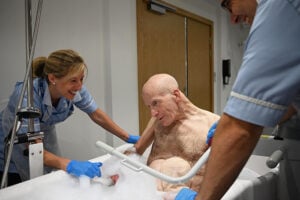
Illnesses you didn’t realise Hospice's support
Hospices are often associated with cancer care, but they provide support for many other illnesses, too. In fact, modern hospice care is designed to support patients with a variety of chronic and life-limiting conditions, including neurological diseases, respiratory illnesses, heart conditions, and organ failure. Each condition presents unique challenges, and hospices offer personalised care to help patients manage symptoms, maintain comfort, and live as fully as possible. Here’s a look at some of the illnesses hospices commonly support, and how they adapt care to meet each patient’s needs.
Dementia and Alzheimer’s Disease
Dementia, including Alzheimer’s disease, affects cognitive function, behaviour, and the ability to perform everyday activities. Hospice care for dementia patients focuses on creating a supportive, calm environment to reduce agitation and anxiety. Care teams also provide memory care support, sensory therapies, and activities designed to enhance connection with family members. Hospice staff are specially trained to understand and respond to the unique needs of dementia patients, helping them retain dignity and comfort throughout their journey.
Neurological Conditions: ALS and MS
Patients with neurological conditions like ALS (amyotrophic lateral sclerosis) and MS (multiple sclerosis) also benefit from hospice care. These diseases can lead to physical disabilities, pain, and respiratory challenges as they progress. Hospice care provides a combination of symptom management, pain relief, and specialised therapies that help patients preserve their abilities for as long as possible. Physical and occupational therapy can be adapted to meet individual needs, helping patients maintain mobility and comfort while giving families support and guidance on caregiving techniques.

Respiratory Illnesses: COPD and Pulmonary Disease
Chronic respiratory illnesses like COPD (chronic obstructive pulmonary disease) and advanced pulmonary diseases affect a patient’s ability to breathe comfortably, often causing fatigue and anxiety. Hospice care provides breathing therapies, oxygen management, and medication to ease symptoms and enhance comfort. Counselling and relaxation techniques are often included to help patients cope with the stress and anxiety that accompany breathing difficulties, and care teams work closely with families to monitor any changes.

Heart Disease and Congestive Heart Failure (CHF)
Heart disease, including congestive heart failure, often brings unpredictable symptoms that can escalate over time. Hospice care for these patients focuses on managing pain, preventing fluid build-up, and monitoring vital signs to ensure comfort and stability. Patients with heart conditions may receive dietary counselling and lifestyle support to help reduce discomfort and prolong well-being. Hospice care teams also support families by educating them on what to expect and providing guidance for symptom management at home.

Kidney and Liver Disease
Chronic organ failure, such as kidney or liver disease, often requires specialised support. These conditions can lead to fatigue, pain, nausea, and other challenging symptoms. Hospice care includes medication management and dietary guidance to ease symptoms, as well as counselling to help patients and families process the emotional and physical aspects of organ failure. By offering tailored support, hospice helps improve comfort and quality of life during the progression of the illness.

Other Conditions Supported by Hospice Care
Hospice care isn’t limited to the conditions listed above. Patients with other serious or complex illnesses, such as advanced diabetes, stroke recovery, or Parkinson’s disease, can also benefit from the personalized approach hospice provides. Each patient’s plan of care is adapted to fit their unique circumstances, with therapies, medication, and counseling designed to meet specific physical, emotional, and spiritual needs.
A Tailored Approach to Each Condition
One of the defining features of hospice care is its focus on individualised, holistic support. Rather than a one-size-fits-all approach, hospice care teams work closely with patients and families to understand each person’s specific needs and preferences. By offering a range of therapies, resources, and compassionate care, hospices can address the distinct challenges that come with different illnesses, giving patients the best possible quality of life.
Hospice care supports patients at every stage of a chronic illness—not only at the end of life. By providing specialised care for a wide array of conditions, hospices make it possible for patients and families to find relief, comfort, and connection, no matter their journey.
Find out more about Hospice care, and how here at
St Michael’s, our care goes beyond the bedside.



